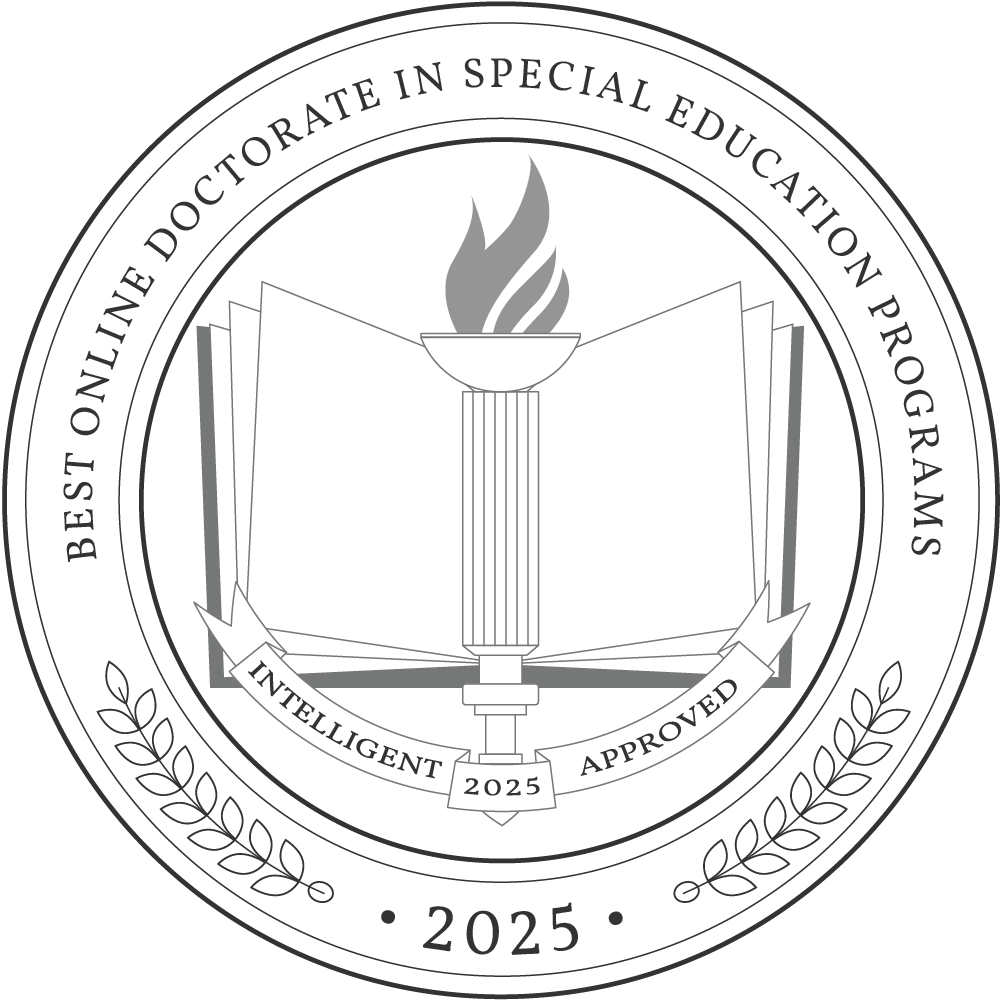An online doctorate in special education prepares students for advanced roles in education, including positions such as special education directors, college professors, and educational consultants. Graduates can expect to earn a median salary of around $80,000 to $110,000 annually, depending on their specific role and location. Postsecondary teachers, for example, earn a median salary of $84,380 a year, according to the Bureau of Labor Statistics.
These programs typically take three to five years to complete, with some variation based on part-time or full-time enrollment. According to the National Center for Education Statistics, the average cost of an online doctorate program ranges from about $12,500 to $30,000 annually. In this program, students will gain expertise in designing and implementing special education programs, conducting research, and leading educational initiatives to improve outcomes for students with disabilities.
Why Trust Us
The Intelligent.com Higher Education Team is dedicated to providing students with independent, equitable school and program rankings and well-researched resources. Our expert-driven articles cover topics related to online colleges and programs, paying for school, and career outlooks. We use data from the U.S. Department of Education’s College Scorecard, the National Center for Education Statistics, and other reputable educational and professional organizations. Our academic advisory team reviews content and verifies accuracy throughout the year for the most current information. Partnerships do not influence rankings or editorial decisions.
- Analyzed over 2,000 national, accredited, and nonprofit colleges and universities
- 800+ rankings pages are reviewed and updated yearly
- Content is informed by reputable sources, surveys, and interviews with academic advisors and other experts
- Over 100 data points are reviewed for accuracy and quality throughout the year, including sources
Our Methodology
Our list features the best online Special Education degree programs at top colleges nationwide. Each school featured is a nonprofit, accredited institution — either public or private — with a high standard of academic quality for post-secondary institutions.
We evaluated each school’s program on tuition costs, admission, retention and graduation rates, faculty, reputation, and the student resources provided for online students. We collected data from trusted sources like the National Center for Education Statistics, individual school and program websites, school admissions counselors, and other data sources. Then, we calculated the Intelligent Score on a scale of 0 to 100 based on the following criterion:
Academic Quality:
- Admission rate versus enrollment rate
- Retention rate of students who return after year one
- Accreditation status (regional and programmatic)
- Nonprofit status, both private and public institutions
Graduation Rate
- Overall graduation rate
- Total number of currently enrolled students, including diversity metrics
- Student-to-faculty ratio
Cost and ROI
- In-state and out-of-state per-credit tuition rates and fees
- Required credits to graduate
- Earning potential after graduation
- Availability of federal student loans, scholarships, and other financial aid options
Student Resources
- Available student services for online-only and hybrid programs
- On-campus amenities like tutoring centers and the number of libraries
Read more about our ranking methodology.
Top 11 Online Doctorate in Special Education Programs Programs
FiltersInstitution Type
Status
- Intelligent Score
- Alphabetically By University Name
- Acceptance Rate
- Enrollment
- In-state Graduate Tuition
- Out-of-state Graduate Tuition
- In-state Undergraduate Tuition
- Out-of-state Undergraduate Tuition

University of Pittsburgh School of Education
Intelligent Score: 98.29In-state: $18,628
Out-of-state: $32,656
In-state: $23,530
Out-of-state: $23,530
SAT: 1243-1420
ACT: 28-32
$1,038
Online, Hybrid
Middle States Commission on Higher Education
84

Regent University
Intelligent Score: 98.05In-state: $17,220
Out-of-state: $17,220
In-state: $15,552
Out-of-state: $15,552
SAT: 940-1220
ACT: 21-29
$800
Online
Southern Association of Colleges and Schools Commission on Colleges
67

Nova Southeastern University
Intelligent Score: 96.55In-state: $32,370
Out-of-state: $32,370
In-state: $20,618
Out-of-state: $20,618
SAT: 1030-1240
ACT: 20-27
$1,597
Online
Southern Association of Colleges and Schools Commission on Colleges
54

Liberty University
Intelligent Score: 95.50In-state: $14,791
Out-of-state: $14,791
In-state: $7,935
Out-of-state: $7,935
SAT: 1040-1250
ACT: 21-29
$595
Online
Southern Association of Colleges and Schools Commission on Colleges
54

University of Northern Colorado
Intelligent Score: 94.90In-state: $7,596
Out-of-state: $19,854
In-state: $10,867
Out-of-state: $10,867
SAT: 980-1200
ACT: 19-26
$688
Online, On-Campus
Council for the Accreditation of Educator Preparation
77-83

Slippery Rock University of Pennsylvania
Intelligent Score: 94.46In-state: $7,716
Out-of-state: $11,574
In-state: $9,288
Out-of-state: $9,288
SAT: 980-1150
ACT: 19-25
Resident: $516
Non-Resident: $568
Online, Hybrid
Middle States Commission on Higher Education
60

Concordia University Chicago
Intelligent Score: 93.75In-state: $32,660
Out-of-state: $32,660
In-state: $9,090
Out-of-state: $9,090
SAT: 990-1180
ACT: 19-25
$735
Online
Council for the Accreditation of Educator Preparation
67

Drexel University
Intelligent Score: 93.53In-state: $53,868
Out-of-state: $53,868
In-state: $36,234
Out-of-state: $36,234
SAT: 1180-1380
ACT: 25-31
$1,481
Online
Middle States Commission on Higher Education
108

Texas Tech University
Intelligent Score: 93.41In-state: $8,683
Out-of-state: $20,953
In-state: $6,788
Out-of-state: $6,788
SAT: 1070-1240
ACT: 22-27
$343 - $472
Online
Southern Association of Colleges and Schools Commission on Colleges
90

Ball State University
Intelligent Score: 90.90In-state: $9,482
Out-of-state: $26,470
In-state: $9,328
Out-of-state: $9,328
SAT: N/A
ACT: N/A
In-State: $464
Out-of-State: $696
Online
Council for the Accreditation of Educator Preparation
91

National University
Intelligent Score: 88.18In-state: $13,320
Out-of-state: $13,320
In-state: $15,480
Out-of-state: $15,480
SAT: N/A
ACT: N/A
$976
Online
Association for Advancing Quality in Educator Preparation
54
How to Choose an Online Doctorate in Special Education Degree Program
Choose your area of study
Choosing your area of study is a crucial step that will shape your academic and career trajectory. This decision should align with your interests, career goals, and the specific needs of the field. Begin by researching various specializations within special education, such as early childhood intervention, behavioral disorders, or autism spectrum disorders. Consider your previous experiences and the type of impact you wish to make. Consulting with current professionals in the field and academic advisors and reviewing curricula can provide valuable insights.
Research schools and programs
Identify accredited institutions with strong reputations in special education. Look into faculty expertise, research opportunities, and program curricula to ensure they align with your interests. Consider the mode of delivery, whether online or on-campus, and the program’s flexibility to accommodate your schedule. Reading reviews, speaking with current students and alumni, and attending information sessions can provide insights. Thorough research helps you make an informed decision, ensuring the program supports your academic and professional aspirations.
Prepare for tests and applications
Determine if there are any required tests, such as the GRE or other standardized exams, and create a study plan to ensure you perform well if so. Gather all necessary documents, including transcripts, letters of recommendation, and a well-crafted personal statement. Tailor your statement to highlight your passion for special education, research interests, and career goals. Additionally, some programs may require professional experience or a portfolio of work. Schedule a meeting with an admissions representative at any potential school who can help you ensure that your application is submitted correctly and on time.
Select your program
Ensure that any program you’re considering aligns with your career goals, areas of interest, and preferred learning format (online or on-campus). Consider factors such as faculty expertise, curriculum, program reputation, and available resources. Avoid schools that do not have relevant accreditation from an organization such as the Council for the Accreditation of Educator Preparation (CAEP) or a regional accreditor. Evaluate the program’s flexibility, support services, and opportunities for hands-on experience or research. Compare tuition costs and available financial aid options. Speaking with admissions counselors and current students can provide valuable insights.
Determine how you’ll pay for your degree
Explore financial aid options, including scholarships, grants, and loans.
Look into assistantships and fellowships offered by your chosen institution, as they can provide funding in exchange for research or teaching assistance. Employer tuition reimbursement programs might also be available if you’re currently in the workforce. With these resources, you may even be able to earn your doctorate for free.
Completing the Free Application for Federal Student Aid (FAFSA) can help you access federal financial aid. Additionally, budget for other expenses such as books, technology, and travel for any in-person residencies.
What Can You Expect From an Online Doctorate in Special Education Degree Program
An online doctorate in special education prepares students for advanced roles in educational leadership, research, and policy development. Students can expect to study advanced instructional strategies, policy analysis, research methodologies, and the latest special education theories and practices. The curriculum typically includes courses on leadership in special education, advanced behavior analysis, inclusive practices, and dissertation research.
The program generally takes three to five years to complete, depending on whether students are enrolled full-time or part-time. A significant component of the program is the dissertation, which requires original research and contributes new knowledge to the field of special education. Some programs may also include comprehensive exams and capstone projects.
In addition to online coursework, students might be required to participate in in-person residencies or practicums. Students should be prepared for these occasional on-campus commitments.
Overall, an online doctorate in special education equips graduates with the expertise needed to lead and innovate in various educational settings, including schools, universities, government agencies, and non-profit organizations, with the potential to earn a median salary of approximately $85,000 to $100,000 annually.
Potential courses you’ll take in an online doctorate in special education degree program
- Advanced Instructional Strategies for Special Education. Covers effective teaching methods and interventions tailored for students with diverse learning needs. Students learn to develop and implement individualized education plans (IEPs) and utilize evidence-based practices.
- Policy and Advocacy in Special Education. Focuses on the laws, policies and ethical considerations impacting special education. Students explore how to advocate for students with disabilities and influence policy changes at local, state, and federal levels.
- Research Methods in Special Education. Students gain a comprehensive understanding of qualitative and quantitative research methodologies. The course prepares them to design, conduct, and analyze research studies, culminating in their dissertation.
- Leadership and Administration in Special Education. Examines the skills necessary for leading special education programs and schools. Topics include staff management, program development, and strategies for fostering inclusive school environments.
- Behavioral Interventions and Support. Delves into techniques for assessing and addressing challenging behaviors in students with special needs. Students learn to implement positive behavioral support plans and measure their effectiveness.
What Can I Do With an Online Doctorate in Special Education Degree?
An online doctorate in special education equips students for elevated positions in the academic world. Whether you’re interested in educational administration or instructional coordination, the skills you develop during your degree program will prepare you to excel in any career path you choose.
Those interested in special education administration and policy may pursue jobs in district offices or postsecondary faculties. Graduates eager to apply their research and instructional strategies to their careers may find rewarding roles as special education specialists and coordinators in specialized curriculum companies.
Career outlook
- Instructional coordinator — Assess the value of a special education curriculum before supervising the implementation and success of the program in an elementary, secondary, or postsecondary school.
- Median annual salary: $74,620
- Projected employment growth (through 2032): 2%
- New jobs projected: 19,200
- Postsecondary teacher — Apply special education research and techniques to a postsecondary classroom context, including one-on-one work, group sessions, or whole-class instruction.
- Median annual salary: $84,380
- Projected employment growth (through 2032): 8%
- New jobs projected: 118,800
- Education administrator — Oversee a special education department, including teacher support, instruction, curriculum development, and milestone assessment.
- Median annual salary: $102,610
- Projected employment growth (through 2032): 4%
- New jobs projected: 15,300
Online Doctorate in Special Education Degree Frequently Asked Questions
How do I apply to an online doctorate in special education program?
To apply to this program, you must submit an online application, official transcripts from previous academic institutions, letters of recommendation, a statement of purpose, and a resume or CV. Some programs may also require GRE scores or a professional portfolio. You’ll also need to meet any prerequisite coursework or professional experience requirements. Contacting an admissions counselor before applying can help you understand specific program requirements, deadlines, and any additional materials needed. An admissions counselor can also provide guidance on the application process and help tailor your application to the program’s expectations.
How much does an online doctorate in special education degree cost?
The cost of an online doctorate varies widely, with average tuition ranging from $500 to $1,000 per credit hour. Total tuition can range from $30,000 to $60,000 or more, depending on the program and institution. Public institutions generally cost less than private, but robust financial aid packages at private institutions can offset the increased cost in some cases. In addition to tuition, students should consider additional costs such as technology fees, textbooks, and any required in-person residencies or workshops. Online programs may offer savings on commuting and housing costs compared to on-campus programs.
How long does it take to earn an online doctorate in special education degree?
Earning an online doctorate typically takes three to five years, depending on the program and the student’s enrollment status. Full-time students can complete the degree faster, while part-time students may take longer due to balancing coursework with other commitments. Online programs may offer more flexibility in pacing, allowing students to progress at their own speed. The total number of required credits, usually between 60 and 90, also impacts completion time. Online programs often have similar academic rigor and requirements to on-campus programs but may differ in the format and delivery of coursework, potentially affecting the overall timeline for completion.
Is a doctorate in special education worth it?
Many special education teachers and caretakers have a bachelor’s degree and teaching credential. An online doctorate in special education provides a robust foundation in educational policy, curriculum, and teaching strategies.
The skills you develop and the research you conduct in your doctorate program inform you of current trends in special education. You’ll be more prepared to meet the multi-faceted needs of your students, whether you choose to pursue administrative roles or curriculum development. In the future, you can also train and support the next generation of special education teachers in best practices for their careers.

